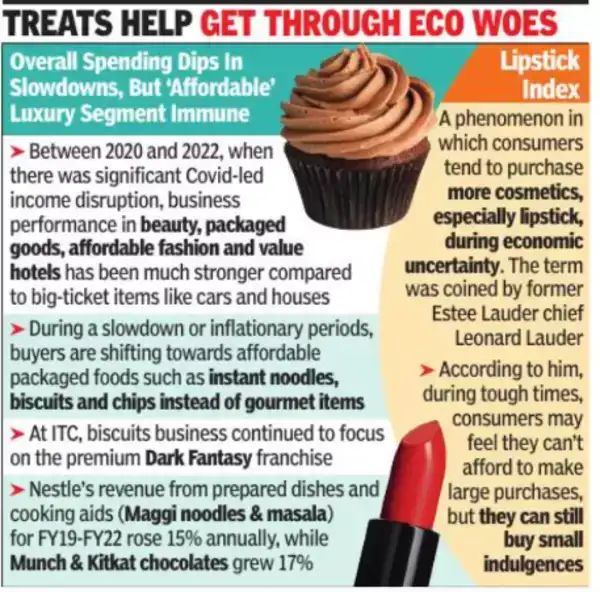Consumers are bypassing big-ticket purchases and opting for more affordable indulgences that uplift their spirits, as indicated by a study conducted by I-Sec in India. This phenomenon, reminiscent of the “lipstick index” popularised during the 2001 recession by Leonard Lauder, chairman of Estee Lauder, holds true for both consumers and companies in India, with sales of discretionary products reflecting this trend.
While the Nifty index has delivered below-inflation returns in recent years, companies in the mid-premium and discretionary goods sectors have experienced a lesser impact on their revenue growth and stock prices during economic slowdowns.
This resilience is evident even in the face of significant income disruption caused by the pandemic between 2020 and 2022. Sectors such as beauty, packaged goods, affordable fashion, and value hotels have shown much stronger business performance compared to big-ticket items like cars and houses. Therefore, the study suggests that the “affordable luxury” segments are relatively immune to general economic slowdowns.
 TNN
TNNThe shift towards affordable indulgences can be seen in various sectors. For example, during a slowdown, consumers gravitate towards affordable packaged foods like instant noodles, biscuits, and chips instead of expensive gourmet items. According to a TOI report, Nestle’s revenue from prepared dishes and cooking aids exhibited robust growth with a compound annual growth rate (CAGR) of nearly 15%, while confectionery products like Munch and Kitkat chocolates recorded just over 17%. Similarly, Britannia’s biscuit segment achieved a CAGR of 14%. This trend is also observed in the affordable fashion and travel sectors, where consumers opt for private labels, scarves, handbags, and small-ticket jewelry instead of pricier alternatives.The behaviour shift during Covid was a testament to the desire for small indulgences and the significance of finding joy in little things, Aditya Birla Fashion and Retail business head (Jaypore) Rashmi Shukla told TOI.
“We recognise that consumer behaviour can evolve during economic downturns. We noticed a shift when consumers moved away from high-end embroidered Kashmiri shawls priced over Rs 75,000 to solid Kashmiri pashminas priced Rs 16,000-20,000. In our homeware section, we saw double-digit growth in the mid-premium section. People moved away from fine porcelain to handcrafted Kansa dinner and serveware. This was also triggered by the consumer’s shift towards healthier living and their yearning for something authentic and rooted,” she added.
Companies like ITC witnessed a premiumisation trend across categories, with their value-added portfolio and premium segments gaining traction. Additionally, there is a preference for affordable travel destinations, exemplified by the occupancy rate for IHCL (Taj hotels), which exceeded pre-pandemic levels.
Consumers now seek brands that offer high-quality ingredients, transparency, trustworthiness, and scientific advancements. This positive momentum in consumption is fueled by the desire for established brands that encompass these qualities, despite the challenges posed by high inflation and global headwinds.
As consumer behavior continues to evolve, Cantabil Retail, an apparel manufacturer in the mid-premium segment, has observed an influx of entrance-level customers due to its reasonable pricing. The company has achieved a remarkable CAGR of 24% from 2019 to 2023, indicating the growing appeal of affordable indulgences among consumers.
As inflation takes its toll on spending power, consumers in India are adjusting their preferences and seeking affordable indulgences to find happiness. This shift in consumer behavior transcends various sectors, with mid-premium and discretionary goods companies displaying resilience in the face of economic slowdowns.
The desire for small indulgences, authenticity, and rooted experiences has become increasingly important, driving the consumption of affordable alternatives. Despite prevailing challenges, there is a quiet positivity permeating the consumption economy, fueled by the evolving desires and evolving needs of consumers.










